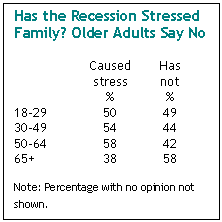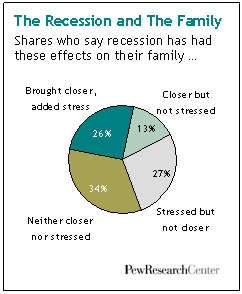Call it the inheritance expectations gap: Three-quarters of all Americans 65 or older plan to leave money or property to their children or other family members. But barely four-in-ten adults with parents 65 or older expect to inherit any money or property.

However, parents and children agree on one thing: the expected size of the inheritance. Among parents planning to leave something to their families, nearly eight-in-ten value the expected bequest at $10,000 or more. Ask adult children expecting an inheritance how much they think it will be and eight-in-ten also say $10,000 or more.
These data do not explain the inheritance expectations gap. Perhaps parents are overly optimistic. Or perhaps many children who do not expect an inheritance will receive one. Whatever the reason, the gap is real and it is wide.
The Recession and Inheritance
Notwithstanding their optimism about leaving an inheritance for their children or other family members, just over half of all older adults who plan to leave an inheritance say the recession will have an impact on the amount of money or property in the inheritance, while three-in-ten say it will not.
Wealthier seniors are the most likely to say that the recession is downsizing their planned bequest. Three-quarters of older adults with incomes of $50,000 or more say the recession has affected how much money they plan to leave, compared with about half (49%) of those with incomes of less than $30,000. The extent of recent investment losses makes little difference in the likelihood of their saying they will have to trim what they leave to their family: About seven-in-ten older adults say the recession has affected their inheritance plan, regardless of whether they lost less than 20% of their investment holdings or more than 40% (76% vs. 71%).
The Recession and Family Stress

The recession has been stressful for many Americans. But hard times also have brought many families closer together, according to a second national survey conducted for this project.2
About half of the public (51%) says the recession has caused stress in their families. In response to a second question, slightly more than a third (36%) also reports that it has brought their families closer together. Overall, women are somewhat more likely than men to say the bad economy has been stressful for their families (55% vs. 48%). And about 39% of women but just 33% of men also say the recession has brought their families closer together.
Familiar age patterns emerge when the public is asked if the recession has been a source of strain on their families. Older Americans are significantly less likely than other age groups to report that the recession has stressed family members: Fewer than four-in-ten adults 65 or older (38%) say economic hard times have been a strain on their families, compared with 52% of those under 50 years old. Among the Threshold Generation — those ages 50 to 64 — nearly six-in-ten (58%) say their families have been stressed by the recession.

A different but equally notable pattern emerges when Americans are asked if the recession has been a source of family togetherness. Four-in-ten adults with younger children — a group particularly sensitive to recessionary shocks — report that the recession has brought their family closer together, compared with 28% of adults with no children and 33% of those whose children are 18 or older.
When these questions are analyzed together, a more complete picture emerges of the emotional impact of the recession on family life. About a quarter (26%) adults say the recession has both stressed their family and brought it closer together. Roughly a quarter (27%) report that the recession has stressed their families but has not brought family members closer together. About one-in-seven (14%) report that the bad economic times have not been a strain but have brought their families closer. And a third of all adults say the recession has neither caused stress nor brought family members closer to each other.




